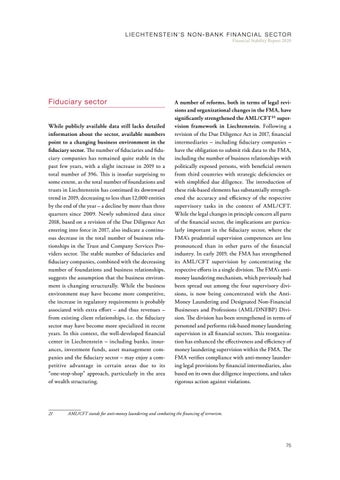LIECHTENSTEIN’S NON-BA NK FIN A NCIAL SECTOR Financial Stability Report 2020
Fiduciary sector While publicly available data still lacks detailed information about the sector, available numbers point to a changing business environment in the fiduciary sector. The number of fiduciaries and fiduciary companies has remained quite stable in the past few years, with a slight increase in 2019 to a total number of 396. This is insofar surprising to some extent, as the total number of foundations and trusts in Liechtenstein has continued its downward trend in 2019, decreasing to less than 12,000 entities by the end of the year – a decline by more than three quarters since 2009. Newly submitted data since 2018, based on a revision of the Due Diligence Act entering into force in 2017, also indicate a continuous decrease in the total number of business relationships in the Trust and Company Services Providers sector. The stable number of fiduciaries and fiduciary companies, combined with the decreasing number of foundations and business relationships, suggests the assumption that the business environment is changing structurally. While the business environment may have become more competitive, the increase in regulatory requirements is probably associated with extra effort – and thus revenues – from existing client relationships, i.e. the fiduciary sector may have become more specialized in recent years. In this context, the well-developed financial center in Liechtenstein – including banks, insurances, investment funds, asset management com panies and the fiduciary sector – may enjoy a competitive advantage in certain areas due to its “one-stop-shop” approach, particularly in the area of wealth structuring.
21
A number of reforms, both in terms of legal revisions and organizational changes in the FMA, have significantly strengthened the AML / CFT 21 supervision framework in Liechtenstein. Following a revision of the Due Diligence Act in 2017, financial intermediaries – including fiduciary companies – have the obligation to submit risk data to the FMA, including the number of business relationships with politically exposed persons, with beneficial owners from third countries with strategic deficiencies or with simplified due diligence. The introduction of these risk-based elements has substantially strengthened the accuracy and efficiency of the respective supervisory tasks in the context of AML / CFT. While the legal changes in principle concern all parts of the financial sector, the implications are particularly important in the fiduciary sector, where the FMA’s prudential supervision competences are less pronounced than in other parts of the financial industry. In early 2019, the FMA has strengthened its AML / CFT supervision by concentrating the respective efforts in a single division. The FMA’s antimoney laundering mechanism, which previously had been spread out among the four supervisory divisions, is now being concentrated with the AntiMoney Laundering and Designated Non-Financial Businesses and Professions ( A ML / DNFBP ) Division. The division has been strengthened in terms of personnel and performs risk-based money laundering supervision in all financial sectors. This reorganization has enhanced the effectiveness and efficiency of money laundering supervision within the FMA. The FMA verifies compliance with anti-money laundering legal provisions by financial intermediaries, also based on its own due diligence inspections, and takes rigorous action against violations.
AML / CFT stands for anti-money laundering and combating the financing of terrorism.
75
